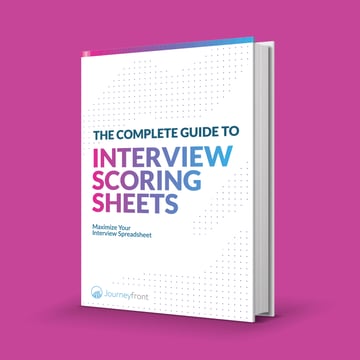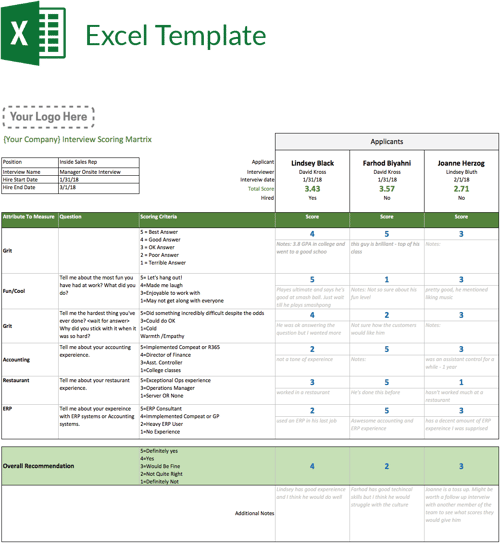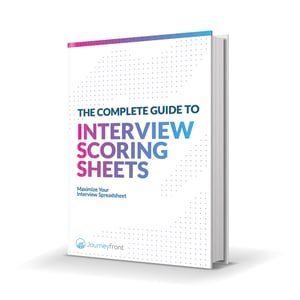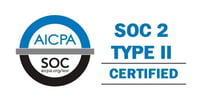 The Complete Guide to Interview Scoring Sheets
The Complete Guide to Interview Scoring Sheets
Interviews are a critical part of the hiring process for most companies as they provide an opportunity to assess a candidate's skills, experience, and fit with the company culture. However, evaluating candidates based on a subjective impression can lead to bias and ineffective hiring decisions.
So that's where interview scoring sheets come in—in this guide, we’ll dive into what interview scoring sheets are, the elements of a scoring sheet, and tips for creating and using a scoring sheet effectively.
In this guide you will learn:
- What are interview scoring sheets
- The benefits of using interview scoring sheets
- Elements of interview scoring sheets
- Tips for creating effective interview scoring sheets
- Creating your interview scoring sheet
- How to use scoring sheets to improve your post-interview discussions
- How to get started with our interview scoring template
What are interview scoring sheets exactly?
Interview scoring sheets are tools used by interviewers to evaluate candidates based on predefined criteria. These sheets provide a structured approach to assessing candidates and can help ensure that all candidates are evaluated consistently and fairly. Interview scoring sheets can be used in interviews to better focus on skills, attributes, and other role-specific needs of the job.
To use interview scoring sheets effectively, you and your team should have a consistent format for your scoring sheets, the number of criteria, and the rating system that will be used. The initial change requires an adjustment in workflow, but the benefits are worth it in the end.
“Interview scoring sheets can be used in interviews to better focus on skills, attributes, and other role-specific needs of the job.”
The benefits of using interview scoring sheets:
- Accountability: Interview scoring sheets promote team accountability by providing a structured and transparent method that can help ensure that all interviewers are asking the same questions and evaluating candidates objectively based on the same criteria.
- Establish the requirements of the position: Interview scoring sheets establish job requirements and evaluate candidates' qualifications and skills against them, helping the hiring team focus on identifying the best candidate based on specific needs.
- Focus: The use of a scoring sheet helps to ensure that the interviewer remains focused on the relevant job-related factors, preventing the interview from becoming too subjective or wandering off-topic.
- Keeps interviews on track: By having a predetermined set of questions and rating system, interviews are more likely to stay focused and consistent across all candidates.
- Promotes objectivity: Interviews can be influenced by personal biases and initial impressions of candidates. Using scoring sheets can help maintain objectivity and consistency in evaluating candidates.
- Remember the interview: Scoring sheets can help interviewers remember details about each candidate and compare them more easily.
- Standardization: Interview scoring sheets provide a standardized way to evaluate candidates' responses, allowing for a fair and consistent assessment across all candidates.
- Documentation: Interview scoring sheets provide a record of the interview evaluation, making it easier to compare candidates and to justify hiring decisions.
Elements of interview scoring sheets
Regardless of the type of interview scoring sheet used, they typically include the following elements:
1. Key skills and attributes being evaluated
The best place to start to find the required skills and attributes is the job description. It typically has all the things that hiring managers are looking for, from years of experience to the specific soft skills needed for the job, like communication and interpersonal skills. If you can't find what you're looking for in the job description, there are many online sources for your specific job. Here are some you can use:
- O-Net (https://www.onetonline.org/) online government database. This website allows users to search occupations by keyword and provides a list of tasks, work activities, skills, knowledge, abilities, interests, work styles, and more.
- Go to job sites and search for other similar jobs (Monster, LinkedIn, and Indeed to name a few.)
- Search for job-specific traits on your search engine (e.g., attributes for a sales rep, work styles for a call center employee).
2. Rating scale and definitions for each level
A rating scale is a tool that allows people to provide a numerical assessment of a particular trait or attribute. It typically consists of a set of predefined categories or levels, with a range of scores from low to high, and with a description of what each score represents. For example, a low score might indicate that the candidate does not meet the minimum requirements, while a high score indicates that the candidate exceeds expectations. The more specific you are in the rating scale the better.
It's important to keep in mind that different people may interpret scores differently, especially if the descriptions are vague or open to interpretation. A specific and clearly defined rating scale improves consistency of ratings and helps identify top candidates, while vague descriptions can lead to inconsistent ratings and errors in the hiring process.
3. Space for interviewer comments and observations
The interviewer should have space to provide comments and observations about the candidate's interview. This information can be used to support the rating given and can provide valuable insights into the candidate's strengths and weaknesses. Interviewer notes are also very helpful during the post-interview discussions so you can recall any specifics that were shared during the interview.
4. Space for interviewer scores
The interviewer should have space to provide a quantitative score for the specific skill or attribute that is being measured. These scores are used to summarize across all questions of the interviewer. There should be enough space for multiple raters to give a score so you can combine and average all scores at the end of the interview. This keeps things objective and makes it easy to compare across all interviewers’ scores.
Tips for creating effective interview scoring sheets
Creating an effective interview scoring sheet requires careful consideration and planning. Here are some tips to help you create a scoring sheet that works for your company:
1. Make sure the skills and attributes being evaluated align with the job requirements
The skills and attributes being evaluated should be directly related to the job requirements. It’s important to identify the specific skills, experience, and qualities that are necessary for the job and include them in the scoring sheet. This will ensure that the scoring sheet provides a clear and accurate picture of the candidate's fit for the role.
2. Use clear and concise language
The language used in the scoring sheet should be clear and concise. Avoid using jargon or technical terms that may not be familiar to all members of the hiring team. The rating scale and descriptions should be easy to understand and consistent across all skills and attributes being evaluated. This will help ensure that all interviewers are interpreting the rating scale in the same way, which will minimize inconsistencies or bias in the evaluation process.
For example, when attribute definitions are unclear, it's more likely that people will misunderstand what the attribute really means. This can lead to inconsistent scoring of applicant responses and introduces errors into the hiring process. Clear and specific attribute definitions make it easier to measure and explain what is being evaluated, increasing the ability to make a strong case for using them in the hiring process.
3. Don't overdo it
Focusing on a few important metrics saves time and provides useful insights more so than trying to measure every detail of an interview. It's easy to overdo it with excessive data, but this can be counterproductive. Targeting key metrics helps identify what's working, and having a strategic approach ensures efficient and effective efforts.
Creating your interview scoring sheet
To build your interview scoring sheet you can either create your own from scratch or start with a template.
Here are some steps to follow for creating an interview scoring sheet:
- Determine the criteria (KSAO)s : The first step is to identify the key criteria that you will use to evaluate candidates. These may include job-related skills, experience, qualifications, personal attributes, and cultural fit.
- Develop questions: Develop a set of questions that align with each of the criteria. These questions should be structured in a way that allows the interviewer to evaluate the candidate's performance against the criteria. These questions should be structured in a way that allows the interviewer to evaluate the candidate's performance against the criteria. You can use Journeyfront’s Interview Question Library to help you get started.
- Build scoring criteria (assign scores): Once you have identified the criteria, you can assign a score or rating to each one. This will typically be a numerical score or rating on a scale, such as 1-5 or 1-10. Make sure that you include a brief description of what each rating on the scale means. A rating of 5/10 could mean passable to someone, while it could mean failure to someone else on the hiring team.
- Enter the questions and attributes into a scoring sheet: It’s important to create both questions and attributes that will be used to assess the candidates. Questions should be specific and relevant to the position being hired, while attributes should be the characteristics or qualities being assessed. By using both questions and attributes in the scoring sheet, it can ensure that the hiring managers are being thorough and consistent in their assessments.
- Add a place for notes: Provide a designated space on the sheet to record scores for each question, and double-check the math to ensure accuracy in scoring and overall candidate evaluation.
- Review and revise: Finally, it is important to review and revise the scoring sheet periodically to ensure that it remains relevant and effective. This may involve updating the criteria or revising the scoring scale.
Here’s an example of an interview scoring sheet:

To help you get started building your own interview scoring sheet we have built an Excel template with multiple types of scoring templates. We've taken care of the math and pre-populated it with interview questions to get you going fast. You can easily make adjustments and changes to fit your unique process. If you don’t have Excel, simply download the file and upload it to your Google Drive. From there, you can import the file into a Google Sheet and it will function the same.
How to use scoring sheets to improve your post-interview discussions
After conducting interviews, it's common for a team to meet to discuss the candidates. During these meetings, it's useful to have notes to back up opinions without relying on "gut" feelings. This is where scoring sheets can refresh the memory and provide a basis for discussing candidates' answers. Each team member can share their scoring sheets, and the group can compare their scores and discuss any discrepancies.
Using interview scoring sheets in this way also helps to ensure that the team is assessing candidates consistently. By using a standardized set of criteria, each team member evaluates candidates based on the same factors. This reduces the risk of one team member evaluating a candidate differently from others and ensures a fair and objective hiring process.
Another benefit of using interview scoring sheets is that they can help uncover bias in the hiring process. By sharing scoring sheets, team members can assess whether their scores accurately reflect the candidate's answers, or if there is a bias that needs to be addressed. This feedback helps to ensure that the team is aware of any unconscious biases they may have and can take steps to address them.
A key tool for effective and fair interviewing practices
Interview scoring sheets are effective tools for evaluating job candidates in a structured and objective manner. These sheets help establish specific job requirements and enable hiring teams to evaluate candidates against them, which ensures a consistent and fair assessment process. However, it’s important to recognize that these tools have limitations, such as being time-consuming, inflexible, and prone to inaccuracies due to interviewer bias or lack of information.
To get the most out of interview scoring sheets, it's important to include key skills and attributes to evaluate and a clear rating scale with definitions for each level. Despite their limitations, interview scoring sheets are valuable for standardized and impartial candidate evaluation, which promotes a fair and consistent hiring process.
Get started with your interview template now
We hope you found our article on interview scoring sheets useful. To make the most of what you have learned, we encourage you to start using our interview scoring template. By utilizing our template, you will have a consistent and structured way of evaluating candidates that will help you make informed and objective decisions. Our template includes a range of questions and attributes that can be customized to meet your specific needs. So, give it a try and see how it can help you streamline your interviewing process and find the best candidates for your organization.






